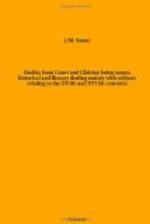I. MARGARET TUDOR
Notwithstanding the spy-system which was brought to so great a perfection under the Tudors, the study of human nature was in their days yet in its infancy. The world had long ceased to be ingenuous, but nations had not yet learned civilised methods of guarding themselves against their enemies. At a time when distrust was general, it was easier, like Machiavelli, to erect deceit and fraud into a science, and to teach the vile utility of lying, than to scrutinise character and weigh motives. It was then generally understood that opponents might legitimately be hoodwinked to the limits of their gullibility; but it was reserved for Lord Chesterfield, two centuries later, to show how a man’s passions must be studied with microscopic intensity in order to discover his prevailing passion, and how, that passion once discovered, he should never be trusted where it was concerned. The study of men’s characters and motives as we understand it, formed no part of the policy of sixteenth-century statecraft, or Wolsey would not have been disgraced, or Thomas Cromwell’s head have fallen on the block. Wolsey and Cromwell were the subtlest statesmen of their age; indeed, in them statecraft may be said to have had its dawn; yet Henry VIII., by the sheer force of his tyranny and despotic will, baffled them both. While Cromwell, the greatest genius in Europe, thought he held all the threads of intrigue in his own hands, his royal master by the dogged pursuit of one end overthrew the minister’s entire scheme. Saturated though he was with Machiavellian theories, a man of one book, and that book The Prince, Cromwell lost all by his inability to read the bent of Henry’s mind and purpose.
Henry VIII. and his elder sister, Margaret, were strikingly alike in character. Both proved themselves to be cruel, vindictive, unscrupulous, sensual, and vain. Both were extraordinarily clever, but Henry being far better educated than his sister, contrived to cut a much more imposing, if not a more dignified, figure. In the matter of intrigue, there was nothing to choose between them. That Henry succeeded where Margaret failed, was owing to the fact that circumstances were in his favour and not in hers. Given two such characters, the only parts that were possible to them were dominating ones. Henry was master of the situation all through the piece; Margaret was not, but she could play no other part. Had she been differently constituted, had she been barely honest, true, constant, and pure, there is no limit to the love and loyalty she would certainly have inspired.
But, for want of insight into Margaret Tudor’s disposition, the Scottish people were repeatedly betrayed by one whose interests they fondly hoped had become, by marriage with their king, identical with their own. She had come among them at an age when new impressions are quickly taken and experiences of every kind have necessarily been very limited, but to the end of her days she remained an alien in their midst.




